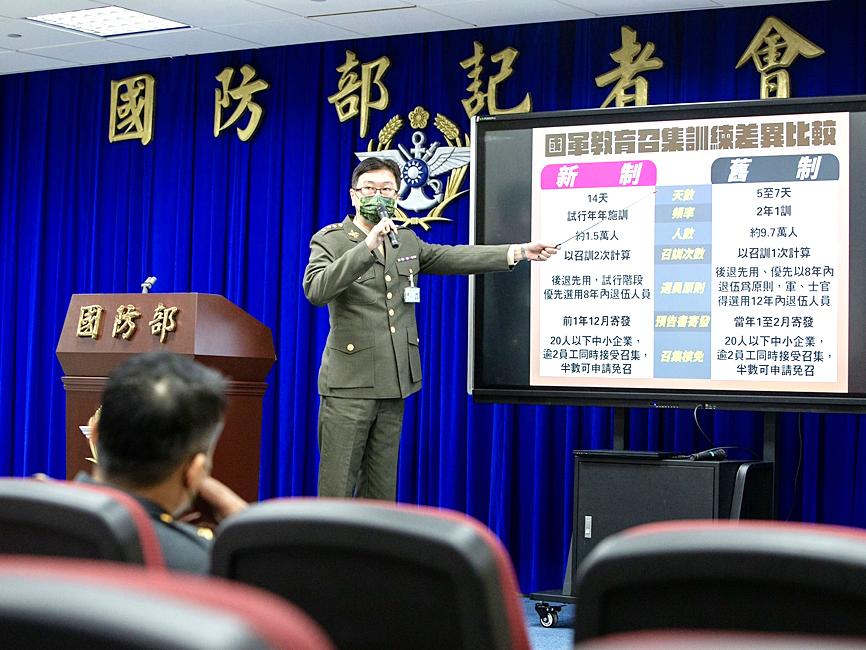The Ministry of National Defense is next year to start trialing a new model of reservist training, which would last for three sessions before the ministry launches a review and assessment of the scheme, an official said yesterday.
Tao Cheng-juei (陶成濬), deputy director of the ministry’s mobilization management division, said that reservist training under the new model would be yearly, lasting 14 days.
The military expects to train 15,000 reservists per year, he added.

Photo courtesy of the Ministry of National Defense
Each session, which would take twice as long as the previous method, and count as two sessions for a reservist, he said.
Reservists who completed their mandatory service within eight years of the training session would be prioritized for recall, he said.
Under the new model, reservists would train with a variety of equipment for a total of 28 hours, up from 12 hours, Tao said.
They are expected to fire 35 rounds with a pistol, 45 with a carbine and 69 with a machine gun, and launch 34 shells with a mortar, up from 15, 21, 33 and 17 respectively, he said.
Combat training would increase to 56 hours, and include marching, camping, squad-based attack and defense simulations, constructing defensive fortifications, administering medicine on the battlefield, using terrain to obtain a tactical advantage, and dismantling fortifications to pass through them, he added.
The military would hold traditional reservist training sessions concurrently with trials of the new model, ministry spokesman Major General Shih Shun-wen (史順文) said.
Retired non-commissioned officers who have not attended four reservist training sessions within eight years of leaving active military duty — a benchmark for being excluded from reservist training — would be listed as eligible for another four years, he added.
To incentivize reservists to attend training sessions, the ministry forwarded to the Executive Yuan a special reservists recall bill.
According to the bill, reservists who voluntarily attend training sessions would be eligible for cash awards starting on their fifth session.
The Military Service Act (兵役法) caps reservist training at four sessions within eight years after completing mandatory service.
Employers of reservists who are recalled for training are obligated to pay reservists as normal, but can file for a tax deduction for 150 percent of the amount when filing their annual income tax, according to the draft act.

Taiwan has received more than US$70 million in royalties as of the end of last year from developing the F-16V jet as countries worldwide purchase or upgrade to this popular model, government and military officials said on Saturday. Taiwan funded the development of the F-16V jet and ended up the sole investor as other countries withdrew from the program. Now the F-16V is increasingly popular and countries must pay Taiwan a percentage in royalties when they purchase new F-16V aircraft or upgrade older F-16 models. The next five years are expected to be the peak for these royalties, with Taiwan potentially earning

STAY IN YOUR LANE: As the US and Israel attack Iran, the ministry has warned China not to overstep by including Taiwanese citizens in its evacuation orders The Ministry of Foreign Affairs (MOFA) yesterday rebuked a statement by China’s embassy in Israel that it would evacuate Taiwanese holders of Chinese travel documents from Israel amid the latter’s escalating conflict with Iran. Tensions have risen across the Middle East in the wake of US and Israeli airstrikes on Iran beginning Saturday. China subsequently issued an evacuation notice for its citizens. In a news release, the Chinese embassy in Israel said holders of “Taiwan compatriot permits (台胞證)” issued to Taiwanese nationals by Chinese authorities for travel to China — could register for evacuation to Egypt. In Taipei, the ministry yesterday said Taiwan

Taiwan is awaiting official notification from the US regarding the status of the Agreement on Reciprocal Trade (ART) after the US Supreme Court ruled US President Donald Trump's global tariffs unconstitutional. Speaking to reporters before a legislative hearing today, Premier Cho Jung-tai (卓榮泰) said that Taiwan's negotiation team remains focused on ensuring that the bilateral trade deal remains intact despite the legal challenge to Trump's tariff policy. "The US has pledged to notify its trade partners once the subsequent administrative and legal processes are finalized, and that certainly includes Taiwan," Cho said when asked about opposition parties’ doubts that the ART was

If China chose to invade Taiwan tomorrow, it would only have to sever three undersea fiber-optic cable clusters to cause a data blackout, Jason Hsu (許毓仁), a senior fellow at the Hudson Institute and former Chinese Nationalist Party (KMT) legislator, told a US security panel yesterday. In a Taiwan contingency, cable disruption would be one of the earliest preinvasion actions and the signal that escalation had begun, he said, adding that Taiwan’s current cable repair capabilities are insufficient. The US-China Economic and Security Review Commission (USCC) yesterday held a hearing on US-China Competition Under the Sea, with Hsu speaking on